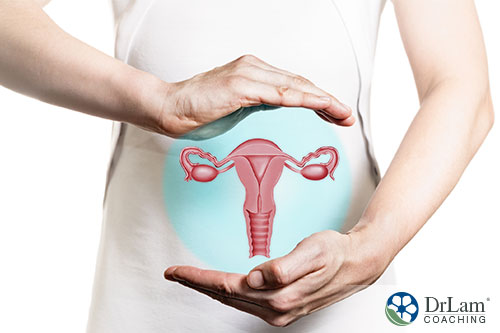 The menstrual cycle can be an ongoing problem for many women. It isn’t uncommon to experience pain, mood shifts, and even changes in your health during certain times of the month. For example, some women seem to experience more infections in the middle of their cycles, when they’re ovulating. This has been a mostly ignored problem for a long time. However, recent studies have found evidence that ovulation lowers immune system function. So, if you tend to get infections during this time, it could help to find out why.
The menstrual cycle can be an ongoing problem for many women. It isn’t uncommon to experience pain, mood shifts, and even changes in your health during certain times of the month. For example, some women seem to experience more infections in the middle of their cycles, when they’re ovulating. This has been a mostly ignored problem for a long time. However, recent studies have found evidence that ovulation lowers immune system function. So, if you tend to get infections during this time, it could help to find out why.
The female immune system is quite different from the male one. While women are less likely to succumb to infectious diseases, they are more susceptible to autoimmune diseases. This could be related to differences in the X and Y chromosomes. It could also be partly caused by estrogen, which is one of the most prevalent hormones in the female body and is pro-inflammatory.
This means that when estrogen levels are high, it could encourage inflammation and infection. However, this idea doesn’t take into account other hormones such as progesterone and estradiol, which can be anti-inflammatory. Further study is needed on this issue but it’s clear that ovulation has some relationship with immune function.
When a woman is ovulating, her body is readying itself for fertilization. This stage of the menstrual cycle occurs around 14 days before the next period is due. At this stage, a number of changes occur that make fertilization more likely. One of the most important elements of this is the way that ovulation lowers immune system function. This prevents the immune system from attacking the sperm. It allows the sperm to live inside of the reproductive tract long enough for fertilization to occur. This is obviously an important part of the reproductive cycle, but it also creates an increased susceptibility to infection.
Research has shown that ovulation lowers immune system function. This may occur because of the hormone estrogen, which is at its highest levels during ovulation. Estrogen lowers the activity of molecules in the immune system that defend against viruses and bacteria. So, if you’re exposed to these pathogens while you’re ovulating, you’re more likely to become infected by them. These pathogens cause sickness when they invade cells.
Ovulating women are also more likely to become infected with fungi during ovulation. A recent study examined how ovulation lowers immune system function in mice. The mice were treated with estrogen and then exposed to Candida Albicans. This is the fungus that causes genital yeast infections. As expected, the mice that were treated with estrogen were more prone to this infection.
An immune system molecule known as TH17 may be responsible for this effect. TH17 is pro-inflammatory and gathers neutrophils and macrophages to infected cells to help them defend against infection. It was found to be lower in the mice that were treated with estrogen. Estrogen binds to the cells that trigger the production of TH17 and blocks the molecule’s production. This may be another way that ovulation lowers the immune system function.
Although this research is promising for ongoing health concerns in women, it is also limited. The actions of other hormones involved in the female reproductive cycle need to be explored. When this occurs, this information can be used to improve women’s health. These insights were also gained in unnatural circumstances when mice had their ovaries removed and were given artificial estrogen supplements. This means that the anti-inflammatory effects of hormones like estradiol are nullified. Without a more holistic picture of the role of hormones in immunity, it will be some time before this info can be used in real life. However, understanding the connection between hormones and the immune system does play a role in managing the effects of stress.
 When you experience high stress levels over a long period of time, it can bring on adrenal fatigue. Everyone’s tolerance for stress is different. And because stress tends to be ongoing in the modern world, it can actually damage the body.
When you experience high stress levels over a long period of time, it can bring on adrenal fatigue. Everyone’s tolerance for stress is different. And because stress tends to be ongoing in the modern world, it can actually damage the body.
The NeuroEndoMetabolic (NEM) Stress Response is the mechanism that’s designed to help your body cope with stress. It causes changes in the way your body functions and prompts the release of cortisol. Cortisol is the hormone that causes the flight or fight response.
Problems can occur when the NEM stress response becomes overused because of chronic stress. The adrenals can start to struggle with the ongoing high demand for cortisol. If the stress isn’t alleviated, the adrenals can even start to degrade, creating imbalances and dysregulations throughout your body, resulting in Adrenal Fatigue Syndrome (AFS).
AFS often causes hormonal imbalances that can add to the problems caused by the way that ovulation lowers immune system function. The part of the NEM that handles your adrenals, hormones, and menstrual cycle is known as the Hormone circuit. The Hormone circuit consists of the ovaries, adrenals, and thyroid.
These three systems are hormonally reliant on each for optimum functioning. But when the adrenals become fatigued because of AFS, this balance can be lost. The other organs can soon become affected, causing issues like menstrual irregularities, as the ovaries become unbalanced, and thyroid malfunction, as the thyroid is affected. The most obvious sign of hormone imbalances are problems with hormone levels, and this often manifests in women as disruptions to the menstrual cycle.
Each woman will experience hormone imbalances differently. Some of the most common health problems associated with hormone imbalances are PMS, fatigue, endometriosis, insomnia, fat accumulation around the waist, irregular menstrual cycles, and fibrocystic breast disease. Estrogen dominance is also fairly common when these problems occur, which can have the same effects on infection susceptibility as ovulation.
 As AFS progresses, many women experience estrogen dominance. This may be even more damaging than previously thought because of evidence that ovulation lowers immune system function. If further research shows it is the case that high estrogen levels cause greater susceptibility to infection, it follows that infection susceptibility may increase when estrogen levels are high because of hormone imbalances as well.
As AFS progresses, many women experience estrogen dominance. This may be even more damaging than previously thought because of evidence that ovulation lowers immune system function. If further research shows it is the case that high estrogen levels cause greater susceptibility to infection, it follows that infection susceptibility may increase when estrogen levels are high because of hormone imbalances as well.
Estrogen is produced primarily by the ovaries but also by the adrenals, egg follicles, and adipose or fat tissue. It’s balanced by the hormone progesterone, which is produced by the corpus luteum. This is a mass of fat cells that the egg leaves behind at the follicle after ovulation. When you have AFS, these hormones can become unbalanced, which causes problems.
Estrogen dominance can occur as the result of age. Between the ages of 35 and 50, progesterone production drops by 75 percent. Estrogen dominance can also occur earlier due to factors such as obesity, stress, lack of exercise, excessive environmental estrogen, and hormone replacement therapy. With AFS, as the adrenals go out of balance and the thyroid becomes underactive, estrogen dominance and low levels of progesterone can worsen.
Ultimately, if the hormonal imbalances associated with AFS increase your susceptibility to infections and inflammation, it could make it harder for your body to address the infections, which will increase your stress levels. And this will worsen AFS.
The Inflammation circuit is often one of the first to be affected when stress is chronically high. This circuit includes the gut, immune system, and the microbiome, and it’s primarily responsible for expelling potentially dangerous invaders. It does this by causing inflammation in response to a threat. The pain, swelling, and redness you experience as inflammation is designed to push the harmful substance out of the body.
However, chronic stress is usually caused by a variety of issues such as an improper diet, general health problems, work pressures, emotional issues, and relationship struggles. These issues are ongoing, leaving the Inflammation circuit with no specific endpoint. Cortisol reduces the inflammation caused by responding to stress, but as cortisol levels begin to drop with AFS, inflammation can increase.
The resulting chronic inflammation can be very dangerous, and many medical professionals are starting to believe it’s one of the most significant modern health dangers.
When you have AFS, your immune system is more likely to be on overdrive. Specific problems like bacterial imbalances in your gut, allergies, and slow-healing infections prompt the immune system to create inflammation. This inflammation can increase stress on the body and eventually cause damage and disease.
Overactivity of the immune system could make you more likely to catch infections. It depletes resources and impedes the processes that fight off infections, so you may experience more severe infections for longer. This is why people with AFS often experience ongoing or concurrent infections that add to their stress levels and worsen adrenal fatigue.
This causes your immune function to degrade over time. If ovulation lowers immune system function when you have AFS, it could add to your already increased susceptibility to infections of all kinds.
 The issues caused by imbalances in the Hormone and Inflammation circuits don't exist in isolation. The hormonal imbalances can worsen the estrogen dominance, increasing susceptibility to infections during ovulation. This worsens inflammation, increasing stress levels further. AFS symptoms and your tendency to get infections may increase even more than usual during ovulation.
The issues caused by imbalances in the Hormone and Inflammation circuits don't exist in isolation. The hormonal imbalances can worsen the estrogen dominance, increasing susceptibility to infections during ovulation. This worsens inflammation, increasing stress levels further. AFS symptoms and your tendency to get infections may increase even more than usual during ovulation.
No system or circuit in the body exists on its own, which is why disorders such as AFS can be so devastating. Symptoms and problems associated with this disorder can have deeply buried causes that most traditionally trained physicians won’t notice or understand. This is why, if you suspect you have AFS and you’re having problems with infections or any aspect of your health, it’s important that you consult a medical professional who’s aware of the disorder and what it can do to the body.
It isn’t enough to say that your infection susceptibility is caused by the way that ovulation lowers immune system function. When you have AFS, the cause will probably be more tangled than that. And to alleviate this stressor, you will need the guidance of someone who understands that. They will better understand how to work within the limits set by your physical condition.
The female menstrual cycle is designed to be the time for fertilization. It's possible that ovulation lowers immune system function in order to aid these processes. The resulting infections or health issues can be troubling enough when you’re healthy. But if you have AFS, they can have a devastating effect on your stress levels and adrenal health. So, be aware of the tendency for infections at this time of the month and take steps to avoid them.
© Copyright 2021 Michael Lam, M.D. All Rights Reserved.
Many women find that they get sick right in the middle of their menstrual cycle. And there are good reasons for that, with a recent study showing that ovulation lowers immune system function and makes you more vulnerable to infection.
